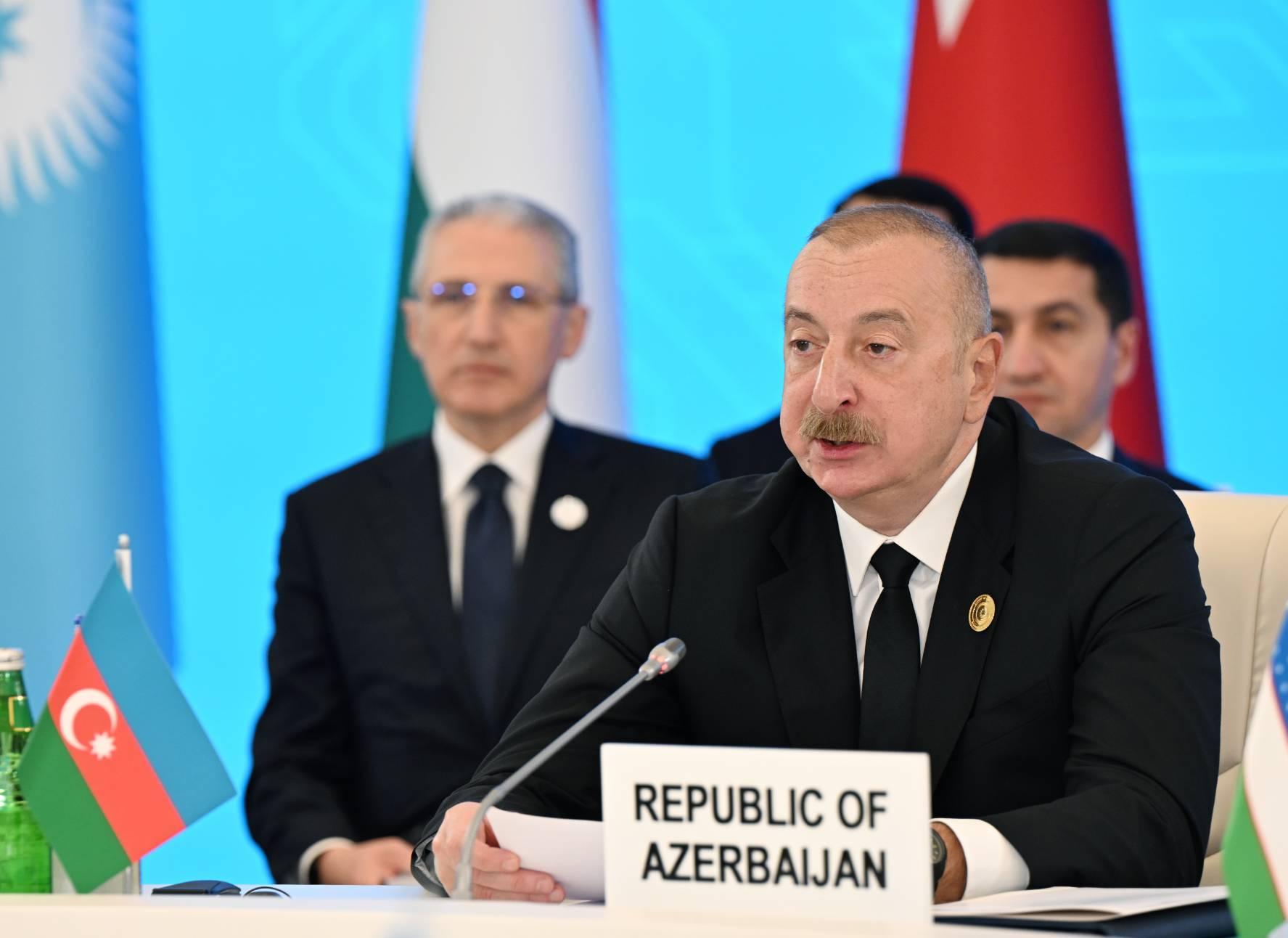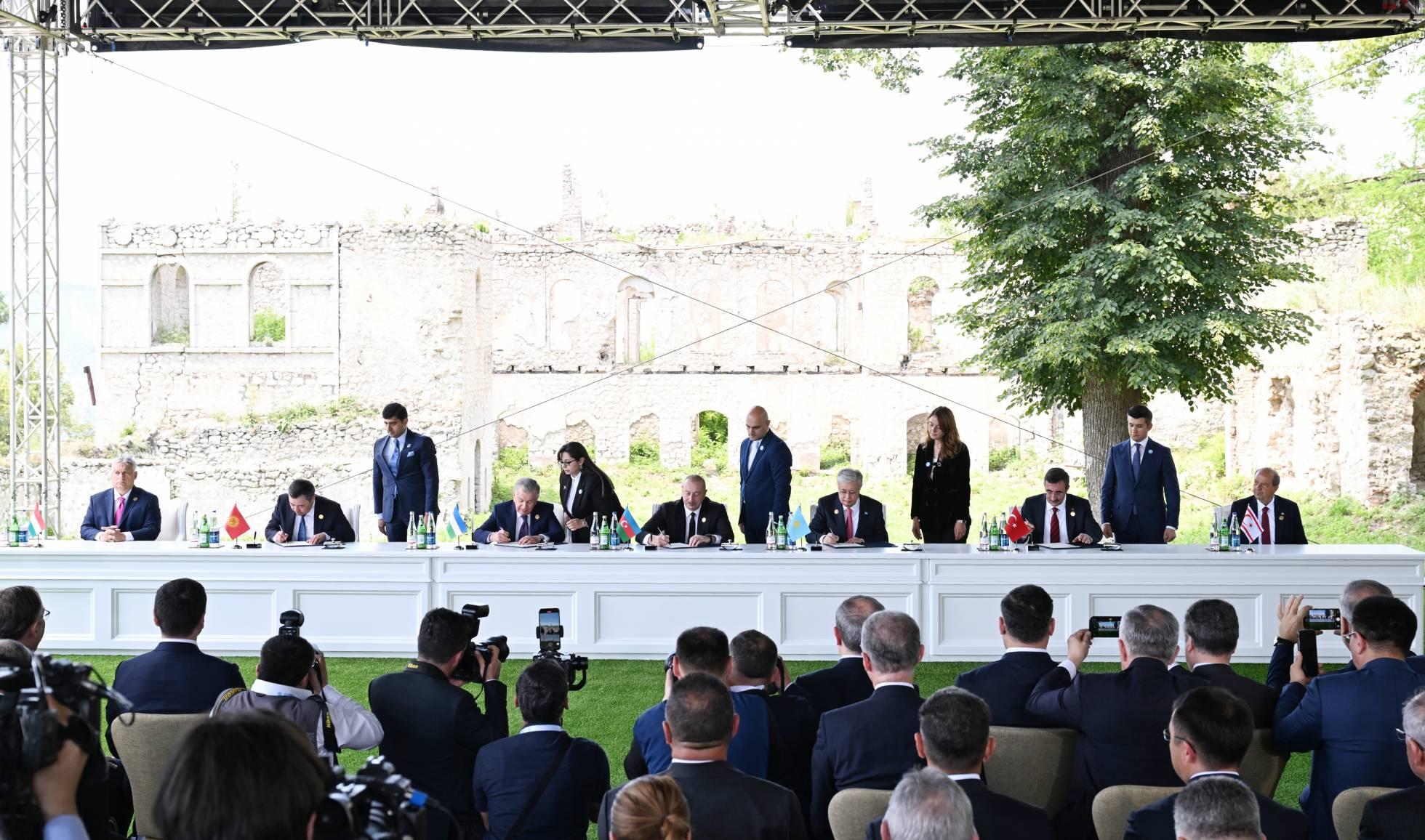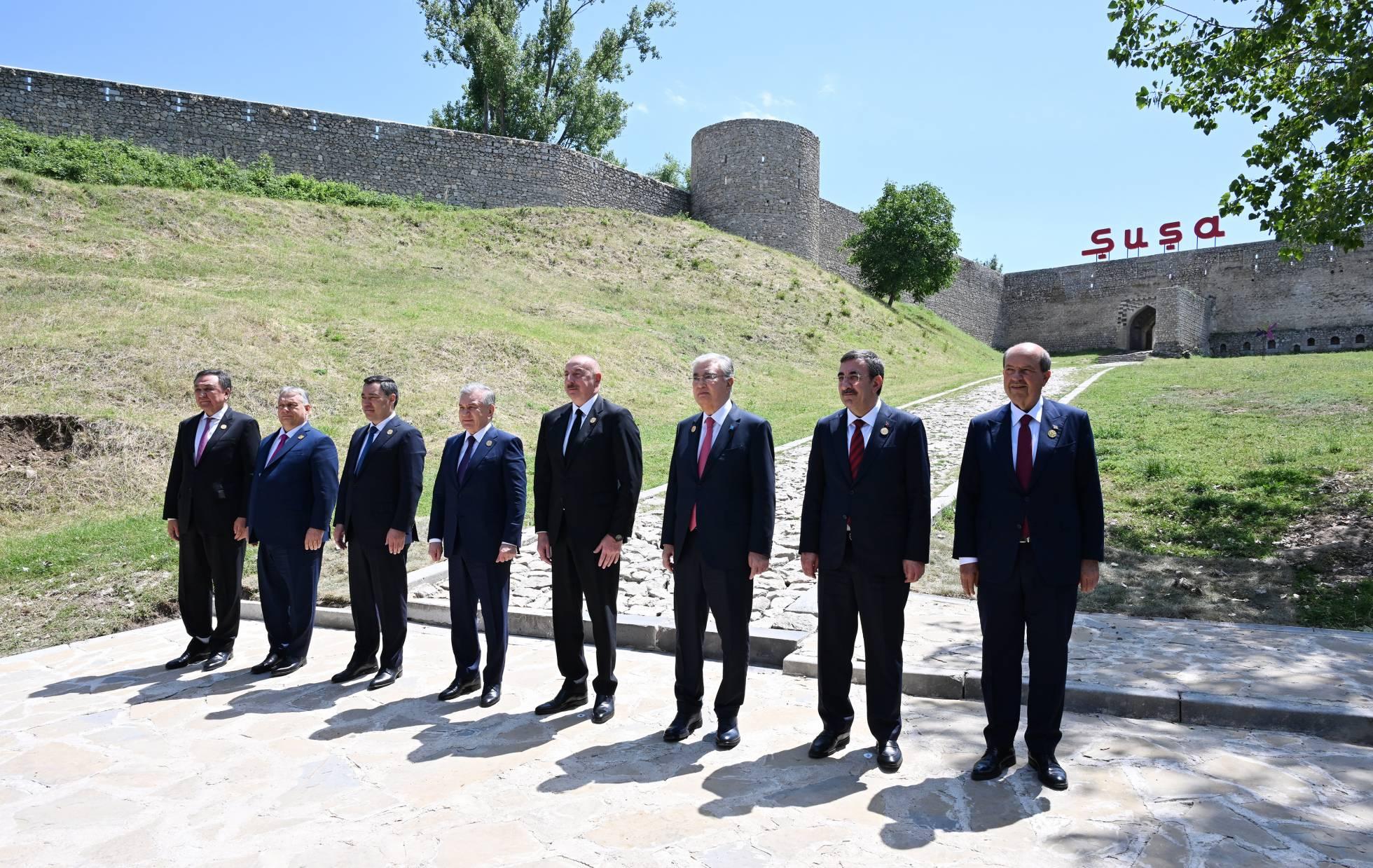Turkic world boosts transport sector, green techologies Proceeding from summit in Azerbaijan’s Shusha
The Central Asian countries, Türkiye and Azerbaijan look like an island of stability and development amid the global turmoil.
Azerbaijan and its partners in the Organisation of Turkic States have historically formed a single civilisation. Today this region has acquired strategic importance in promoting new world trends in transport corridors, energy and the green technologies.
The prospects for cooperation among the Turkic countries in these spheres were the key topic of the recent informal summit of the Organisation of Turkic States held in Shusha and the meeting of the Council of Foreign Ministers of the Organisation of Turkic States’ member states held before the forum.
During a relatively short period of time, the Organisation of Turkic States was able to take its rightful place in the international arena. It was possible to launch stable and viable integration mechanisms in the economic sphere, formulating the Turkic world as a new geopolitical reality thanks to the will of the member states of the Organisation of Turkic States.
The need for such integration is extremely urgent at the moment, given the negative changes of recent years, namely, trade wars, civilisational confrontation among the global West, East and South.
The Turkic world, geographically located in the vast Caspian region and the Middle East demonstrates friendship and business partnership, promoting integration initiatives in transport, hydrocarbon and green energy, as well as implementing joint investment projects in the industrial and agricultural sectors, trade, tourism, IT technologies, as well as in the humanitarian and educational sectors amid this negative background.
Taking into account the above-mentioned aspects, it is quite obvious that the strengthening of business cooperation with Central Asian countries and Türkiye is one of the main vectors of Azerbaijan’s foreign policy and economic strategy in the recent period, including the transport and logistics sector, taking into account the big needs of the regional countries, China and the EU for the transshipment of goods, namely, hydrocarbons, fuel, grain, metal concentrates, fertilizers, equipment and machinery along the alternative Middle Corridor.
The key theme of the informal summit in Shusha was “Building a Sustainable Future through Transport, Connectivity and Climate Action”.
The summit participants discussed the issues of strengthening the Middle Corridor and its most important component – the Trans-Caspian International Transport Route, strengthening of logistics, increasing of cargo transportation and trade among the countries.
The preparation for the 29th Conference of the Parties to the UN Framework Convention on Climate Change (COP 29), which will be held in Azerbaijan on November 11–22, 2024 was also discussed.
“The 21st century must be a century of progress of the Turkic world. We cover a vast geography with positive demographic dynamics in the Member States. Our abundant natural resources and modern infrastructure for their delivery, transport corridors connecting Central Asia and the Caucasus with Mediterranean and Black Sea ports, our rich and ancient history and culture are our great assets. The commitment of our peoples to traditional values and their shared ethnic roots closely bind our countries,” Azerbaijani President Ilham Aliyev said at the opening ceremony of the informal summit of the Organisation of Turkic States in Shusha.

The development potential of the Turkic world inspires optimism.
The total GDP of the member states of the Organisation of Turkic States exceeds $1.5 trillion, while the population has exceeded 160 million people and is growing dynamically. The Turkic countries are attractive for localising production clusters due to a relatively inexpensive and qualified labour market and a favourable business and investment climate.
Kazakhstan, Turkmenistan and landlocked Uzbekistan and Kyrgyzstan, located on the eastern coast of the Caspian Sea, together with Azerbaijan and Türkiye, are intensifying cooperation within the three main vectors of the Middle Corridor – Transport Corrdior Europe-Caucasus-Asia (TRACECA), the Trans-Caspian International Transport Route (TITR), as well as the Lapis Lazuli route.
Partner countries are coordinating the plans to optimise regional logistics, modernising and introducing digital technologies into transport infrastructure, unifying transportation tariffs and the customs legislative framework.
The efforts of the member states of the Organisation of Turkic States in partnership with China are aimed at multiplying cargo traffic through TITR, and in this regard, the port and railway infrastructure of the Caspian region is being modernised.
“The annual handling capacity of the Baku-Tbilisi-Kars railway, an integral part of the Middle Corridor, has been increased from 1 million to 5 million tons thanks to additional investments by Azerbaijan. Azerbaijan, with the fleet of more than 50 commercial ships in the Caspian Sea, provides important transit services for Turkic states. In light of the increasing cargo transportation, six tankers and dry cargo vessels are currently under construction at the Baku Shipyard. Next year, our country’s ninth international airport will be commissioned in Lachin. The cargo handling capacity of the Alat International Trade Seaport will be expanded from 15 million to 25 million tons,” President Aliyev said by outlining the advantages of the Azerbaijani transport sector.
Similar steps are being taken on the eastern coast of the Caspian Sea. While delivering a speech at the Shusha summit, Kazakh President Kassym-Jomart Tokayev reminded that last year the volume of cargo transportation along the Middle Corridor increased by 65 per cent or almost three million tons.
President Tokayev noted that the modernisation of the maritime hub in the port of Aktau makes it possible to increase the number of transported containers to 300,000 and to date, the volume of container traffic along the Middle Corridor has doubled compared to 2023.
A Digital Trade Corridor multimodal digital platform was launched to reduce a cargo delivery period.
“It is necessary to expand the volume of trade turnover and cargo transportation with member states of the Organisation of Turkic States and other countries, the potential of TITR should be fully used,” President Tokayev said.

The transport and logistics capabilities of the Turkic states, growing every year, contribute to the growth of the dynamics of trade relations among the member states of the Organisation of Turkic States and their partners in Europe.
Thus, Türkiye, Azerbaijan, Central Asian countries, as well as Hungary, which is actively cooperating with the Organisation of Turkic States, are building new mechanisms to increase the non-oil trade volume.
The trade turnover among the Turkic countries amounted to $42.3 billion and in value terms increased by 27.3 per cent in 2023 compared to the previous year, while the total trade turnover of the Turkic countries with other countries reached about $1.3 trillion.
It is important that almost a quarter of the total trade turnover among the member states of the Organisation of Turkic States falls on Azerbaijan, and last year its volume amounted to about $9 billion.
Hungarian Minister of Foreign Affairs and Trade Péter Szijjártó spoke about the high efficiency of cooperation with the Organisation of Turkic States countries at the recent Council of Foreign Ministers meeting in Shusha.
“Turkic countries play a vital role in returning to global cooperation, and during Hungary’s presidency of the EU Council, strengthening of ties with the member states of the Organisation of Turkic States is a priority,” he said.
Szijjártó noted that the trade volume with these countries grew by 27 per cent and reached $5 billion in 2023.
He reminded that Hungary has recently contributed $100 million to the Turkic Investment Fund, which expands the access of Hungarian companies to the regional markets of Turkic countries.
The issue of developing the financial organisations of the Organisation of Turkic States was raised at the recent summit in Shusha. President of Kazakhstan Kassym-Jomart Tokayev proposed to create a Council of Turkic Central Banks.
The forum in Shusha became another opportunity to discuss the Azerbaijani-Turkish business cooperation, including the activity of the Organisation of Turkic States.
According to the statement made during negotiations between Azerbaijani Foreign Minister Jeyhun Bayramov and his Turkish counterpart Hakan Fidan.
The statement was made at the meeting that cooperation between Baku and Ankara, joint projects in economic, energy, communication and humanitarian aspects of the Azerbaijani-Turkish alliance have made a significant contribution to regional stability and cooperation.
Bayramov expressed hope that the summit will be remembered for the adoption of documents and decisions that will contribute to the development and strengthening of business cooperation within the Organisation of Turkic States.

“Our strategic partnership in the field of energy, including cooperation in the field of renewable energy and energy efficiency, is very important. As you know, Azerbaijan will host the COP29 this year. I would like to take this opportunity to once again invite all of you to the COP29,” President Aliyev said by outlining another important priority for long-term cooperation among the Turkic countries.
The green technologies are new and extremely important ones for the member states of the Organisation of Turkic States intending to expand cooperation in the renewable energy sector.
The “Memorandum of Cooperation on Integration of Energy Systems” signed in Tashkent on May 1, 2024 among Azerbaijan, Kazakhstan and Uzbekistan can be cited as an example. This document is intended to stimulate the implementation of joint goals towards the production of green energy and its export to Europe through Azerbaijan within the Black Sea Energy project, as well as the integration of energy systems and the efficient use of resources in the renewable energy sector.








